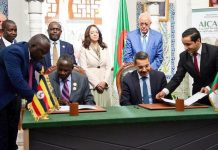By Gertrude Kamya Othieno
Africa-Press – Uganda. In September 2025, the Government of Uganda handed the Anglican Church 4,000 land titles. Officially, this was a gesture of protection, shielding church property from the encroachers who have become the scourge of land tenure in Uganda.
The Ministry of Lands assured believers that titles would not only secure their inheritance but also enable development projects such as farming, schools, and hospitals.
The Church of Uganda itself promised to use this new security for long-term planning, even beginning to plant coffee as a revenue stream.
On the surface, it sounds like common sense. Yet history urges caution. When religion and land meet, power is never far behind.
Luther’s Germany: Theology Meets Property
The 1517 Reformation is remembered as a spiritual revolt against indulgences. But it also had profound economic consequences.
By the sixteenth century, the Catholic Church owned vast, tax-exempt estates across Europe. German princes resented the wealth that drained to Rome.
Luther’s protest gave them cover. By breaking with the Pope, they freed themselves from Rome’s authority and seized church estates within their territories.
Theological dissent opened the door; political economy marched through it. What began as a cry of conscience ended as a wholesale redistribution of land and power.
Colonial Africa: The Invention of Private Land
Across much of Africa, land had long been held communally, managed by clans, families, or kingdoms, and accessed through use and stewardship rather than individual title.
It was colonialism that entrenched the system of private ownership and titling, reshaping land from a shared trust into an exclusive, tradable asset.
The aim was not protection but control: to secure estates for settlers, missionaries, and colonial allies while creating legal frameworks that favoured a few and excluded the many.
Buganda 1900: Titles for a Few, Tenancy for the Many
The 1900 Uganda Agreement exemplified this colonial shift. Almost half of Buganda’s land, some two million hectares, was distributed as mailo titles to around 3,000 chiefs, collaborators, and the Kabaka.
Ordinary Baganda became tenants (bibanja holders), obliged to pay rent (busuulu) and tribute in produce (envujjo).
Tenants resisted, not in open revolt, but through everyday acts of non-compliance, petitions, and appeals to both the Kabaka and colonial officials.
By the 1920s, this agitation coalesced in the Bataka movement, demanding rights for clan members excluded from land.
The colonial state responded with the 1928 Busuulu and Envujjo Law, which capped rents and offered limited security of tenure. Landlordism survived, but it was never accepted quietly.
Uganda 2025: Protection or Consolidation?
Fast forward to the present. The Anglican Church’s 4,000 new titles are not fresh gifts, but the legal recognition of holdings it has long been possessed through colonial inheritance, donations, and community grants.
The problem was that much of this land was untitled, leaving it vulnerable to grabbers. Formalisation is meant to close that gap.
Yet history reminds us that such moments change more than legal paperwork. Once land moves from communal trust to formal title, perceptions shift.
Communities that once saw church land as “ours” may begin to see it as “theirs”, a corporate asset managed by diocesan boards rather than a shared patrimony of faith.
Titles may protect against external grabbers, but they can also consolidate institutional power.
The echoes are hard to ignore. Rome’s bishops, Germany’s princes, Buganda’s chiefs all rose to power through land. Each time, the justification sounded noble. Each time, ordinary people ended up excluded.
The Lesson
Church-led land ownership can be a blessing when treated as a social trust, feeding, educating, and sustaining. But history shows how easily it hardens into privilege. Henry VIII confiscated monasteries.
The French Revolution stormed church estates. Buganda’s peasants agitated until they won rent reform.
Uganda now faces a choice. The Church can steward its titled lands transparently, ensuring they serve believers and communities. Or it can slip into the old cycle, where land creates oligarchs sanctified by religion.
From Luther’s Reformation to the 1900 Uganda Agreement to today’s Anglican land titles, the pattern is the same: sanctifying land often concentrates power in the hands of a few. The question for Uganda is whether faith is being protected or whether a new landlord class is quietly being consecrated.
______________________________________________________________________
Ms Gertrude Kamya Othieno is a political sociologist, alumna of the London School of Economics (LSE),
Source: Nilepost News
For More News And Analysis About Uganda Follow Africa-Press






